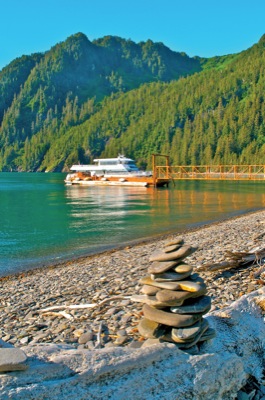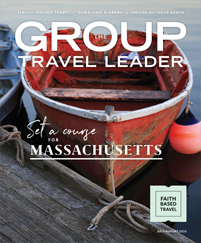
Terry Dale, Chairman, United States Tour Operators Association (USTOA)
Bud Geissler, Incoming President, Student Youth Travel Association (SYTA)
Peter Pantuso, President and CEO, American Bus Association (ABA)
Lisa Simon, President, NTA
This year marks the 10th anniversary of 9/11. For better or worse, how have those events impacted travel in the long term?
Dale: One of the most important things we have seen post-9/11 is that U.S. citizens did not stop traveling. They still have wanderlust, they want to visit and experience the world, and they’re doing so today. But as they travel the world, there is a heightened sense of awareness to their surroundings. And that is a good thing, because you always need to pack common sense when you travel. So while there may have been a short-term lag right after 9/11 as people sort of wrapped themselves in a cocoon at home, they did come back; they’re traveling today but with a higher degree of awareness of the environment they are traveling within.
Geissler: As the tragedies of 9/11 and the international events that followed changed the world, the student travel industry saw an immediate impact too. Over the 10 years since, our industry has adapted to heightened security at museums, airports and international borders.
Technology has enabled us to be very clear with teachers, students and parents as to what documents and security procedures they should expect in different situations. Those events also impacted the destinations students traveled to. More second-tier cities saw an increase in business as groups looked for “safe” places to travel. They also increased local business for destinations and attractions within driving distance of schools and communities.
Pantuso: Up until 2001, people were making travel plans months in advance. But since 9/11 — and this has recently been reinforced by the economic downturn — people are booking closer in. That pattern is partly security-based and partly economics-based, as people now want to make sure they’re going to have a job before they commit to travel.
Immediately post-9/11, obviously, the airlines took a big hit, and people stopped flying or pulled way back. People who were still traveling turned to the motorcoach, because they wanted to know they had a vehicle that was going to be able to come back when they were ready, and they wanted to be certain that they were going to be on the ground and be safe. Once people found the coach, they stuck with it.
Simon: 9/11 had a profound impact on travel and tourism. The ongoing threat of terrorism brought about the Department of Homeland Security, TSA [the Transportation Security Administration] and security checks at airports. Some people see this as a very unpleasant aspect of travel. Those of us in the industry understand and support the importance of safety and security; we must continue to advocate for traveler-friendly experiences to dispel the negative perceptions.
Special-interest travelers have been more resilient, even in times of crisis, so niche and affinity groups have grown significantly. Recognizing that diversifying their product mix was critical to survival, particularly to tap into these new markets, tour operators and travel businesses embraced partnering as a necessity, and it is now the norm.
9/11 also brought about global enlightenment for many Americans. It placed a spotlight on the intrinsic value of travel, which opens minds, expands horizons and develops cultural understanding among people.
What is the most significant social, political or economic trend that will impact group travel over the next decade?
Geissler: SYTA represents many aspects of the student travel industry. We have groups that travel for fun, to explore, to compete, to perform and to learn. They travel down the road and around the world, so there is not one trend in particular.
Many factors impact the number of students traveling. The use of technology to educate teachers, students, parents and other decision-makers about travel possibilities and requirements continues to be a major positive factor. Of course, the economy is the most important negative factor right now. If municipalities and school systems lose funding for music and the arts, athletics and teachers, the number of school groups traveling will decline.
Pantuso: People today are looking for less expensive ways to go, and this is having an impact on travel patterns and on the growth of motorcoach business. A younger demographic has really caught hold of the motorcoach, in part because the coach offers amenities like Wi-Fi and comfortable seating, but also because of the inconvenience of other modes of transportation, like airlines, and most importantly, because of the cost efficiency of the coach compared to a lot of other forms of transportation.
Our challenge within the industry has always been getting people to hop on the buses and see what they have to offer. Now that they’ve been traveling by bus, and now that they’re becoming more frugal, I think the new generation of travelers who have found the coach will stay on it, not only for point-to-point service, but also when they’re looking to gather a group together and go visit the wine country.
Simon: Speaking about travel in general and not specifically group travel, I see a combination of social, political and economic issues impacting travel. This is because of the growing global awareness. Around the world, we’ve seen the growing desire for freedom, which creates more opportunities for citizens of these nations, as well as for visitors who want to go there to see what’s happening.
As people are becoming more globally aware, they create social situations that impact travel. They may react differently and become citizen advocates against political barriers to travel. And economic struggles will have less of an impact, as we’re already seeing, because people need to travel.
All group travel plays a huge role in a people-to-people experience through the enrichment of traveling together and the opportunity to engage with other cultures. In particular, we’re seeing a significant rise in faith-based tourism, where groups are either visiting religious sites and destinations, or simply traveling for fellowship.
Dale: I believe the civil unrest that we have observed over in the Middle East will continue, and the way it will continue is through social media. We have already seen how that way of communicating has galvanized grassroots efforts to express concern with governments and elected officials, and because social media is gaining in its reach in all demographics, I think it will allow grassroots efforts to continue around the world to express concern. I think we’ll continue to see civil unrest take place and to really shape and impact government. Ultimately, that impacts our ability as groups to travel around the world.
In the age of online travel agencies and independent-minded consumers, what is the role of influential individuals (i.e., group leaders) in organizing group travel? Has it changed in recent years, and will it change in the future?
Pantuso: I think there’s always going to be the individual who is the organizer, the planner, who is involved in their community, their church, their clubs. I think the biggest change is going to be how they get the information and how they plan the trip.
In the future, the group leader is going to have to do the research in advance; they are going to have to be working with other tour operators. They are going to have the world at their fingertips, so the idea of traveling locally or regionally is not something they are going to have to be wedded to. They are going to have the ability to put that group together and plan that tour anywhere with the electronic tools they’ve got at hand.
I don’t see that individual leader going away, but I see them being in somewhat of an expanded role, just because of the wealth of information that they’ll have available to them in the future.
Simon: The Internet and online travel sites will continue to shape and reshape the travel experience from start to finish. However, research shows that the majority of people still book tours and packages through a professional and a personal connection rather than online. Many people only use the Internet for research.
Travelers’ preferences will continue to change, and the easiest way for a group leader to stay on top of this and look like a hero to his or her group is having a strong relationship with a tour operator. A group leader can work with a tour operator to customize the experience to meet the needs of the group. This is what those independent-minded travelers want, and this is not what the online travel agencies can provide.
Dale: Being the leader has always been a very important role, but it becomes increasingly serious as we move forward, because nothing is constant any more. Whether it’s nature or civil unrest that has impacted an experience you’ve created for a group in some part of the world, as the leader of this group, you are the caretaker, and you’ve got to be able to respond, be flexible, have backup plans. You also need to have respect and credibility. Your travelers look to you to provide them with a safety net.
Darwin said, “It is not the strongest of the species that survives, nor the most intelligent that survives. It is the one that is the most adaptable to change.” I think that quote is so appropriate for group leaders: You’ve got to provide the experience the consumers are seeking, but you’ve also got to adapt and respond to the ever-changing environment that we face daily in the travel industry.
Geissler: There is no substitute for a tour operator and an educated group leader when it comes to student travel. Our tour operators understand what it’s like to travel with 15 or 200 or sometimes even 500 students at a time — and they do it regularly. They have destination partners who are friendly to and prepared for the student market.
A SYTA tour operator has the chance to network with nearly a thousand industry partners — restaurants, hotels, amusements parks, attractions, DMOs, CVBs and anyone who hosts the youth market — at our annual conference; this is when they hear the newest destination information, travel trends, safety best practices and business opportunities. This information is then passed on to group leaders as they consider their next destination or competition venue. Again, technology has also provided our members ways to inform group leaders of the need to use a SYTA tour operator and how important it is to understand the student market.
What is the appeal of group travel to the coming generation of travelers? What are the “selling points” of group travel as we move into the future?
Simon: We need to always think about how we’re promoting “group travel.” To some age demographics, the word “group” is not appealing, and with that in mind, many tour operators now offer small-group experiences or FIT packages for families and independent travelers.
Regardless, the appeal of group travel, or packaged travel, is evergreen. People want a memorable experience at a good price, and they get that with tours and packaged travel. It’s all about value, security, convenience and choice. This is exactly what a tour operator provides.
I am absolutely spoiled by tours. There’s nothing better than not having to plan, manage, think about a vacation. We’re all so busy these days that having a professional take care of all the details is an affordable luxury. Plus, the types of experiences you can enjoy on a tour are truly limitless.
Dale: Future generations are all about experiential travel. They want to have a life experience that they couldn’t potentially create on their own as a solo traveler. As group travel leaders, you have the ability to gain access, because there’s a purchasing power from a group. Maybe it’s to a museum that extends its operation an hour so that your group can interact with an artist-in-residence without other people as distractions. This access and the experiences that you are able to create is something that individuals can’t do on their own.
If you’re creative and innovative in how you leverage this access, you can attract future generations to have a shared experience. All kinds of communities of like-minded people with a common interest communicate and interact through social media. Because like-minded people share this bond, they want to travel together as a community. If you harness that common interest and community spirit, the younger generation will see group travel as a positive thing.
Geissler: Group travel is a great way to connect curriculum to reality, practice to performance and classroom to career. You want to explore a destination your teacher talked about two years ago, and you can’t figure out how to get there, get around, where to eat, where to stay. Our members have done their homework: They understand the local traffic patterns, they have an alternate route, they have the cell phone number of the attraction manager in case of a delay. They do the work, and you have the time of your life.
We can talk all we want about Lewis and Clark, but until a student stands beside a river and hears from a trained guide how an expedition was conducted through the rapids raging 50 feet away from them, the circle has not become complete. A band can practice diligently for months, but when they finally have the opportunity to apply their passion in front of a large audience, only then can they truly feel the reward for their hard work.
Pantuso: Consumers are not focused on group travel. They’re focused on what they’re going to do, what the trip’s about, what’s of interest to them, and whether they have the ability to influence what that trip looks like, as opposed to being told what that trip is going to look like.
Nobody thinks of taking a cruise as being group travel; although, when you put 3,000 people together on a tour, you can’t deny it’s group travel. The difference is in the ability to give that consumer choice all along the way. From the time you book that ship, you choose what your room is going to be like, whether you are going to eat at the buffet or pay a premium to have white-glove service, which of a dozen activities you want to do on shore or whether you want to just relax on your own.
It takes more time, it takes more effort. But study after study shows the customer wants choice, and they’re willing to pay for it.











